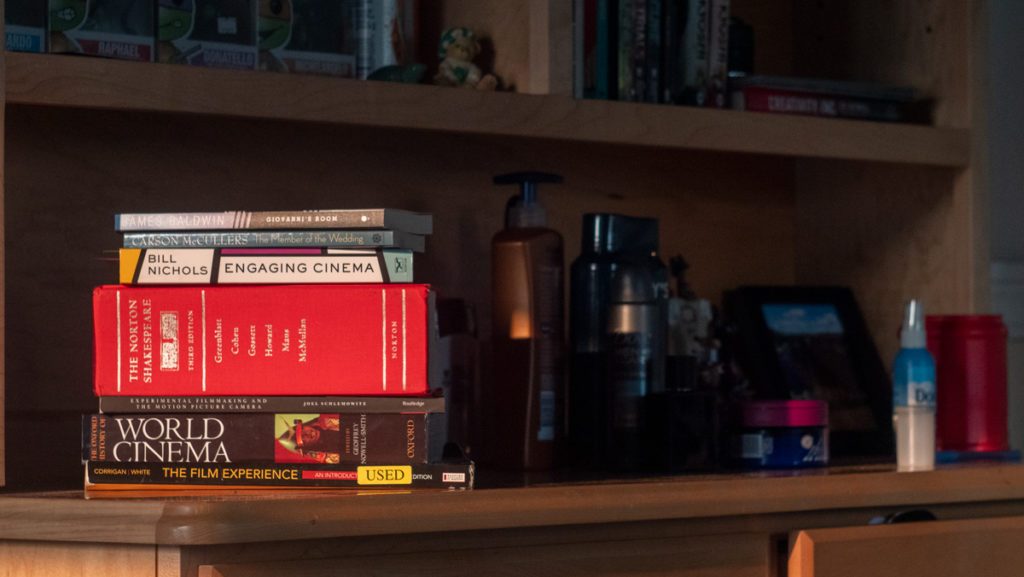The Ithaca College Campus Store has transitioned from selling textbooks on campus to utilizing a virtual textbook service amid shifting trends in course material purchasing habits.
The new online platform officially opened in August and allows students to access the online bookstore through HomerConnect or the campus store’s website. When students use their Netpass accounts to log in, the online platform Akademos automatically brings up all of the required textbooks for the courses they are registered for and offers different purchasing options based on a range of prices, sellers and media, like hard copies or e-books.
Students have gradually shifted in the way they buy their textbooks, choosing to purchase them online rather than in person, Rick Watson, director of college stores, said. A study done by the National Association of College Stores in 2019 demonstrated a 14% decrease in spending on college course materials during the 2018–19 academic year. According to the same study, 89% of college students access free materials, like website articles and academic journals, as opposed to priced textbooks. The college’s campus store has lost over $1 million in textbook sales over the last decade, Watson said.
Watson said that the campus store will no longer sell textbooks in person and will be relying on the online platform to provide students with textbooks.
Akademos partners with colleges across the country, including The City University of New York and the University of South Dakota, to turn their bookstores into online and hybrid stores. Akademos also works with thousands of publishers and content distributors, like McGraw Hill and Pearson. The platform has a price-match guarantee, meaning that if a student finds the book for less on another online retail site, the difference will be refunded.
In previous semesters, sophomore Elizabeth Dawson bought her textbooks in person at the campus store but found the new online website to be user-friendly when she used it this semester.
“I like how it lays out all the options for you and the comparison places to buy it,” Dawson said. “Then, you don’t even have to search for your textbook. It just tells you what’s needed. So I really appreciated how easy it was to do it.”
The new system also allows faculty members to access a more in-depth search system. Faculty members can search textbooks by subject and emphasize lower-cost options for students, like open-source materials that range up to $20, Watson said.
Jack Bryant, associate professor and program director of the Department of Media Arts, Sciences and Studies, said that he places his textbook order with the campus store but purposely tries to choose textbooks that are less expensive for his students.
“I tell students if they can find them cheaper online, they can certainly order them that way or used, or, if they want to share their textbooks and buy them in groups, … it’s totally fine with me,” Bryant said.
Bryant said that he has also worked with the Ithaca College Library this semester, a resource that has digitized some textbooks’ chapters and uploaded the PDF versions onto his Sakai site for students to use.
Julie Fromer, lecturer in the Department of English, said she chose not to use the new virtual textbook service. Instead of requiring her students to buy physical copies of the books they read in class, Fromer is using Perusall, an e-reader platform. The software is free to use but requires students to pay for certain texts. Fromer said that students can annotate, highlight and comment on the texts as a group, as well as reply to each other’s comments and questions.
“I really decided to go this route because I felt that it was an opportunity to build community through reading, … and, in that sense, I think it was the perfect semester to experiment with this,” Fromer said.
College students at four-year colleges and universities spend an estimated average of $1,200 on textbooks every year, according to the College Board. The college estimates that books and supplies will cost undergraduate students $1,000 per academic year. A CBS report from 2018 said that over the past 10 years, the average cost of textbooks has risen four times faster than the rate of inflation. While the virtual bookstore does provide students with more options, students like senior Jasmine Morrow, Class of 2021 senator for the Student Governance Council, continue to lament the cost of textbooks.
“I think textbooks are still too expensive, and the prices didn’t really change that much from last year,” Morrow said via email. “The prices definitely should’ve been reduced since a lot of us are unemployed, and textbooks are a huge cost.”
The affordability of textbooks has been a frequent topic of conversation at the SGC, sophomore Soumyaa Joshi, vice president of academic affairs for the SGC, said.
“I feel like it’s just always a general concern for all students,” Joshi said. “It’s just always something that college students are going to have to struggle with. So anything to make that easier and more affordable — I definitely want to continue working on that.”
In February 2019, Hunter Simmons, former Class of 2022 senator, proposed and passed the Equal Opportunity Textbook Act. The bill recommended that faculty at the college use the college’s preexisting open educational resources — digital resources like open textbooks and course modules — that serve as alternatives to textbooks, as opposed to having students purchase physical copies of textbooks. The SGC previously passed a bill in 2016 that initiated a discussion about using open textbooks in classrooms.
Joshi said the Senior Leadership Team was in favor of the Equal Opportunity Textbook Act, but because of COVID-19 and the timing of the bill, the SGC wasn’t able to move forward with enacting the initiatives of the bill.
“Last spring semester when we started to go remote, I know I had a meeting with the provost [La Jerne Cornish] where she said that they were basically working on making all the textbooks for a majority of the classes available online through the typical college library system, so I believe that’s pretty much the main way that we kind of got to see this bill come to life and actually be in effect,” Joshi said.
Joshi said that she thinks the SGC should revisit the initiatives of the bill and continue to focus on making sure that textbooks can be more affordable and accessible to students.
Outside the virtual bookstore, students frequently turn to other resources to procure their required textbooks. Websites like Chegg, VitalSource and Library Genesis are popular among students searching for cheaper, online versions of their textbooks.
IC Textbook Exchange is a private Facebook group that was created at the end of August by sophomore Sara Ostermeier. The page has 348 members as of Sept. 24 and allows students to buy and sell textbooks from other students, as well as put out a search for a textbook they’re looking for.
The textbooks being sold are primarily used and often sell for hundreds of dollars less than a newer version would. For example, a textbook needed for “Organic Chemistry” has a list price on the virtual bookstore of $367 but was selling for $50 on IC Textbook Exchange – almost 86% less.
Dawson joined IC Textbook Exchange to search for used textbooks while she tried to avoid buying newer, pricier textbooks.
“I’d rather support my peers than buy something brand new,” Dawson said.









